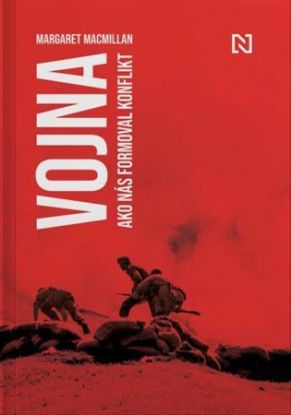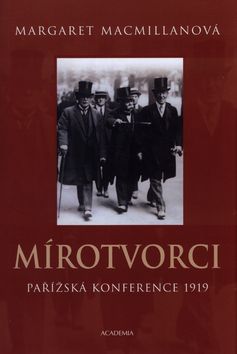Margareth Macmillanová
autor
Vojna: Ako nás formoval konflikt
Je mier iba anomáliou? Autorka Margaret MacMillan ponúka provokatívnu perspektívu založenú na tvrdení, že vojna predstavuje elementárnu súčasť ľudského bytia.
Ľudia možno prichádzajú na svet s vrodeným inštinktom bojovať, no vojnu organizované násilie dokáže viesť len plnohodnotne usporiadaná spoločnosť. Bojové konflikty ovplyvnili históriu ľudstva, jeho spoločenské a politické inštitúcie, hodnoty aj ideály. Veľkoleposť vojny, ale aj útrapy, ktoré spôsobuje, nájdeme v jazyku, vo verejnom priestore, vo svojich súkromných spomienkach a zároveň sú nevyčerpateľnou témou najzásadnejších svetových umeleckých diel. Skúmanie fenoménu vojny je neľahké a komplikované: odhaľuje totiž naše najhoršie, ale aj najlepšie vlastnosti.
Margaret MacMillan analyzuje, ako vojna ovplyvnila ľudskú spoločnosť a ako politická organizácia, technológie a ideológie zmenili to, ako a prečo bojujeme. Kniha Vojna: Ako nás formoval konflikt sa venuje diskutovaným a kontroverzným otázkam, ako napríklad: Kedy sa zrodila vojna? Naozaj sme odsúdení na neustály boj medzi sebou? Prečo je vojna najzorganizovanejšou ľudskou činnosťou? Dokážeme niekedy stanoviť jej pravidlá? Prečo sú medzi bojovníkmi takmer výlučne muži?
Na príkladoch od antiky až po súčasnosť MacMillan odhaľuje mnohé podoby vojny a jej vplyv na našu minulosť, budúcnosť, naše videnie sveta a samotnú podstatu človeka.
dostupné aj ako:
Vojna
Je mier iba anomáliou? Autorka Margaret MacMillan ponúka provokatívnu perspektívu založenú na tvrdení, že vojna predstavuje elementárnu súčasť ľudského bytia.
Ľudia možno prichádzajú na svet s vrodeným inštinktom bojovať, no vojnu – organizované násilie – dokáže viesť len plnohodnotne usporiadaná spoločnosť. Bojové konflikty ovplyvnili históriu ľudstva, jeho spoločenské a politické inštitúcie, hodnoty aj ideály. Veľkoleposť vojny, ale aj útrapy, ktoré spôsobuje, nájdeme v jazyku, vo verejnom priestore, vo svojich súkromných spomienkach a zároveň sú nevyčerpateľnou témou najzásadnejších svetových umeleckých diel. Skúmanie fenoménu vojny je neľahké a komplikované: odhaľuje totiž naše najhoršie, ale aj najlepšie vlastnosti.
Margaret MacMillan analyzuje, ako vojna ovplyvnila ľudskú spoločnosť a ako politická organizácia, technológie a ideológie zmenili to, ako a prečo bojujeme. Kniha Vojna: Ako nás formoval konflikt sa venuje diskutovaným a kontroverzným otázkam, ako napríklad: Kedy sa zrodila vojna? Naozaj sme odsúdení na neustály boj medzi sebou? Prečo je vojna najzorganizovanejšou ľudskou činnosťou? Dokážeme niekedy stanoviť jej pravidlá? Prečo sú medzi bojovníkmi takmer výlučne muži? Na príkladoch od antiky až po súčasnosť MacMillan odhaľuje mnohé podoby vojny a jej vplyv na našu minulosť, budúcnosť, naše videnie sveta a samotnú podstatu človeka.
Na stiahnutie
14,90 €
dostupné aj ako:
Mírotvorci
Pohled britské historičky Margaret MacMillanové na pařížskou mírovou konferenci (1919), jež zásadně proměnila do té doby existující svět, je nejen nový a překvapivý, ale v mnoha ohledech také šokující. Dokumentuje pohnutky, úvahy a činy "mírotvorců" -- tedy mužů, kteří sami vzali osud světa do vlastních rukou a v nejlepší víře ve své počínání pak bezděky přivedli svět k další světové válce.
Vypredané
15,13 €
15,93 €
Women of the Raj
The apparent glamour of the Indian Raj continues to fascinate long after the British quit the subcontinent. But along with the beauty of the Indian landscape and the privilege of servants and holidays in hill stations, British women in that vanished world faced challenges and fears that came from being an alien ruling minority. These women were at the heart of the imperial enterprise. It was their role to support the men’s work, raise the children and attempt to replicate British society thousands of miles from home. They struggled in the face of heat, illness, loneliness and boredom as well as different customs, languages and religions. The distinguished historian and bestselling author Margaret MacMillan, drawing on letters and memoirs, novels and interviews, brings vividly to life their experiences – humdrum, extraordinary, light-hearted, tragic – at the height of the Raj, from the 1850s to Indian independence in 1947.
Vypredané
12,30 €
12,95 €
The War that Ended Peace
WINNER of the International Affairs Book of the Year at the Political Book Awards 2014 Longlisted for the Samuel Johnson Prize 2013 The First World War followed a period of sustained peace in Europe during which people talked with confidence of prosperity, progress and hope. But in 1914, Europe walked into a catastrophic conflict which killed millions of its men, bled its economies dry, shook empires and societies to pieces, and fatally undermined Europe's dominance of the world. It was a war which could have been avoided up to the last moment - so why did it happen? Beginning in the early nineteenth century, and ending with the assassination of Arch Duke Franz Ferdinand, award-winning historian Margaret MacMillan uncovers the huge political and technological changes, national decisions and - just as important - the small moments of human muddle and weakness that led Europe from peace to disaster. This masterful exploration of how Europe chose its path towards war will change and enrich how we see this defining moment in our history.
Vypredané
16,10 €
16,95 €
War: How Conflict Shaped Us
The time since the Second World War has been seen by some as the longest uninterrupted period of harmony in human history: the 'long peace', as Stephen Pinker called it. But despite this, there has been a military conflict ongoing every year since 1945. The same can be said for every century of recorded history. Is war, therefore, an essential part of being human?
In War, Professor Margaret MacMillan explores the deep links between society and war and the questions they raise. We learn when war began - whether among early homo sapiens or later, as we began to organise ourselves into tribes and settle in communities. We see the ways in which war reflects changing societies and how war has brought change - for better and worse.
Economies, science, technology, medicine, culture: all are instrumental in war and have been shaped by it - without conflict it we might not have had penicillin, female emancipation, radar or rockets. Throughout history, writers, artists, film-makers, playwrights, and composers have been inspired by war - whether to condemn, exalt or simply puzzle about it. If we are never to be rid of war, how should we think about it and what does that mean for peace?
Vypredané
22,75 €
23,95 €
War
New York Times 10 Best Book of 2020
Sunday Times best book for Autumn 2020
Guardian critics' pick for Autumn 2020
Wall Street Journal notable book of 2020
The time since the Second World War has been seen by some as the longest uninterrupted period of harmony in human history: the 'long peace', as Stephen Pinker called it. But despite this, there has been a military conflict ongoing every year since 1945. The same can be said for every century of recorded history. Is war, therefore, an essential part of being human?
In War, Professor Margaret MacMillan explores the deep links between society and war and the questions they raise. We learn when war began - whether among early homo sapiens or later, as we began to organise ourselves into tribes and settle in communities. We see the ways in which war reflects changing societies and how war has brought change - for better and worse.
Economies, science, technology, medicine, culture: all are instrumental in war and have been shaped by it - without conflict it we might not have had penicillin, female emancipation, radar or rockets. Throughout history, writers, artists, film-makers, playwrights, and composers have been inspired by war - whether to condemn, exalt or simply puzzle about it. If we are never to be rid of war, how should we think about it and what does that mean for peace?
Vypredané
13,25 €
13,95 €











